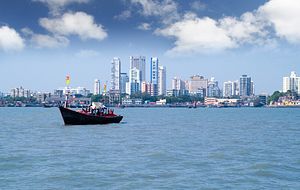Does Indian Finance Minister Arun Jaitley have a fiscal vision that can inspire and stir the blood? He will present his second budget on February 28. His first effort was a patchwork affair in the middle of the last fiscal year after winning the general election. Jaitley then lacked time for a major fiscal overhaul; this time he must deliver.
He should frame his budget as the first step in India becoming the leading Asian tiger. Toward this end, he should pledge to reform India’s direct tax rates and practices to compete with the best in the Asian neighborhood.
Back in 1997, Finance Minister Chidambaram presented a vision of competing with ASEAN in import duties as a first step to becoming an economic tiger. This meant reducing India ’s standard import tariff from 50 percent to 8-10 percent in stages. This vision was adopted by succeeding finance ministers of other parties, and the target of ASEAN equivalence was met in 2004. This helped accelerate GDP growth to over 8 percent over the next five years.
Jaitley should follow the same path with regards to direct taxes. India’s maximum income tax rate of 33.9 percent is well above that of Singapore, but competitive with most other Asian states. But its corporate tax rate of 34 percent is much higher than in China (25 percent), Thailand (20 percent), Malaysia (25 percent), and Indonesia (25 percent). India should cut its rate to 25 percent, and simultaneously trim its multitude of tax exemptions, to be more in line with competing countries.
Prime Minister Narendra Modi recently promised an end to “tax terrorism.” Unable to meet revenue targets in recent years, Indian taxmen have cracked down in irrational ways on supposed tax evasion by multinationals like Vodafone and Shell. Jaitley should aim to grow revenue by attracting additional investment rather than through tax terrorism. He should align India’s transfer pricing rules, advance tax rulings, and other tax practices with those of Asian competitors.
Jaitley aims for a constitutional amendment to create a unified Goods and Services Tax (GST) in place of the current complicated system that divides powers of indirect taxation between the central and state governments. The existing system leads to tax cascades and huge opportunities for corruption and evasion. Experts estimate that a unified GST could raise GDP by 2-2.5 percent. But many states want to retain tax-raising powers, denting the ideal of a uniform national tax. GST will be a process, not a single event, but Jaitley needs to start that process.
He has set a fiscal deficit target of 4.1 percent of GDP in the current fiscal year, to be reduced to 3.6 percent and 3.0 percent in the next two years. Some influential economists want to go slow on deficit reduction to finance urgently needed infrastructure. The public-private partnership model for infrastructure has ended in tears, with over-leveraged private companies unable to service debts and dragging down the banks with them. New financing has to come mainly from the government.
Still, Jaitley should stick to his fiscal reduction schedule to build global confidence and a reputation for reliability. Increased infrastructure spending should be financed by aggressive sales of government assets — shares of corporations, land, spectrum and mineral rights. Fortunately the boom in stock markets has made sales feasible at good prices.
Modi seeks foreign investment in India’s railways and ports. He must first convert the Railway Board and all port trusts into corporations. Only then can their equity be subscribed to by private investors.
The fall in oil prices has enabled Jaitley to end the diesel subsidy. Up to 40 percent of subsidized kerosene is used not for lighting in non-electric areas but for adulterating diesel. He should shift to cash transfers in lieu of subsidized kerosene, ending price distortions and adulteration. Indeed, he needs to experiment with cash transfers in place of current very leaky subsidies on cooking gas, fertilizer, and food. This will lower subsidies while getting to the needy. Modi’s financial inclusion drive has provided 115 million new bank accounts, making possible cash transfers to maybe 90 percent of people.
Current fiscal strains are best eased by a good business climate that accelerates GDP and tax revenues. Modi is devising reforms to move India from 142nd position in the World Bank’s ease-of-doing-business index to 50th position. Jaitley’s budget should spell out the key new ideas for slashing red tape.
Finally, some low-hanging fruit are just waiting to be picked. Betting is illegal in India, yet massive bets are placed on cricket matches and elections. Jaitley should legalize betting, starting with cricket, and levy taxes on this. The cricket World Cup competition has begun, and punters are already betting humungous sums. They will happily pay a tax for legal cover. Jaitley must go for it.
The author is a Research Fellow at the Cato Institute.

































